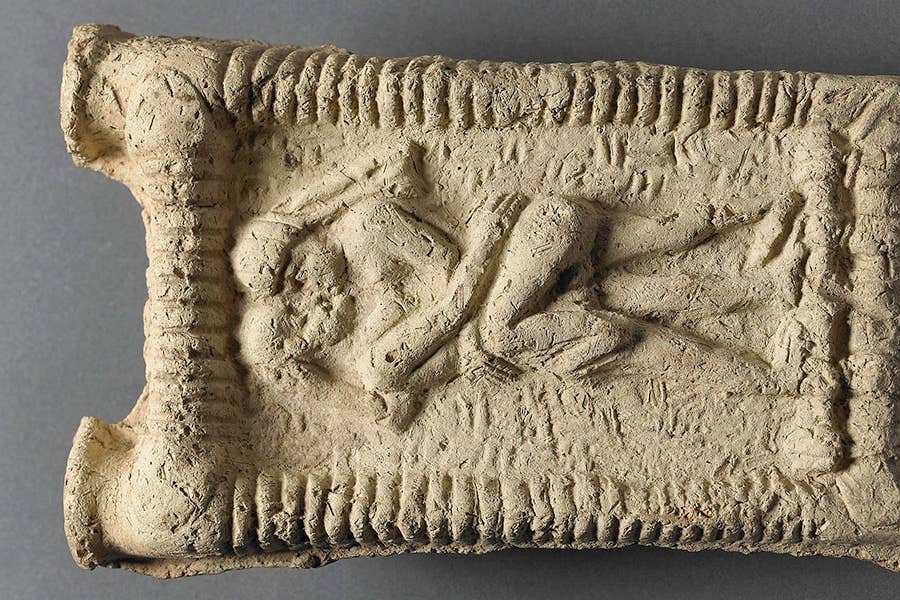Humans were kissing as early as 4,500 years ago – research
Scientists said they have found literary evidence that kissing was practised in the earliest Mesopotamian societies.

Your support helps us to tell the story
From reproductive rights to climate change to Big Tech, The Independent is on the ground when the story is developing. Whether it's investigating the financials of Elon Musk's pro-Trump PAC or producing our latest documentary, 'The A Word', which shines a light on the American women fighting for reproductive rights, we know how important it is to parse out the facts from the messaging.
At such a critical moment in US history, we need reporters on the ground. Your donation allows us to keep sending journalists to speak to both sides of the story.
The Independent is trusted by Americans across the entire political spectrum. And unlike many other quality news outlets, we choose not to lock Americans out of our reporting and analysis with paywalls. We believe quality journalism should be available to everyone, paid for by those who can afford it.
Your support makes all the difference.Humanity’s earliest recorded kiss dates back to around 4,500 years ago in the ancient Middle East – 1,000 years earlier than previously thought, according to researchers.
Scientists said they have found literary evidence that kissing was practised in the earliest Mesopotamian societies and may even have contributed to the spread of of cold sores.
In their article, published in the journal Science, the researchers said the findings suggest kissing was common across many cultures and did not originate in a specific region.
They said this contradicts a previous hypothesis that the earliest evidence of human lip kissing came from a specific area in south Asia 3,500 years ago.
Dr Troels Pank Arboll, an expert on the history of medicine in Mesopotamia at the University of Copenhagen in Denmark, said: “In ancient Mesopotamia, which is the name for the early human cultures that existed between the Euphrates and Tigris rivers in present-day Iraq and Syria, people wrote in cuneiform script on clay tablets.
“Many thousands of these clay tablets have survived to this day, and they contain clear examples that kissing was considered a part of romantic intimacy in ancient times, just as kissing could be part of friendships and family members’ relations.
Kissing should not be regarded as a custom that originated exclusively in any single region
“Therefore, kissing should not be regarded as a custom that originated exclusively in any single region and spread from there but rather appears to have been practised in multiple ancient cultures over several millennia.”
Studies on bonobos and chimpanzees – the closest living relatives to humans – have shown they engage in kissing.
This suggests the practice of kissing is a fundamental behaviour in humans and explains why it can be found across cultures, the scientists said.
The researchers also said kissing may have unintentionally played a role in the transmission of viruses such as herpes simplex virus 1 (HSV-1), which causes cold sores.
Dr Arboll said: “There is a substantial corpus of medical texts from Mesopotamia, some of which mention a disease with symptoms reminiscent of the herpes simplex virus 1.”
But he added that ancient medical texts can be influenced by cultural and religious concepts so they cannot be read at face value.
Dr Arboll said: “It is nevertheless interesting to note some similarities between the disease known as buʾshanu in ancient medical texts from Mesopotamia and the symptoms caused by herpes simplex infections.
“The bu’shanu disease was located primarily in or around the mouth and throat, and symptoms included vesicles in or around the mouth, which is one of the dominant signs of herpes infection.”
Recent studies have shown that modern-day viruses that spread through kissing, such as HSV-1, Epstein-Barr virus, which causes glandular fever, and human parvovirus B19, which causes a bright red rash on the cheeks in children, were present in ancient times.
Dr Sophie Lund Rasmussen, of the University of Oxford, said: “If the practice of kissing was widespread and well-established in a range of ancient societies, the effects of kissing in terms of pathogen transmission must likely have been more or less constant.”